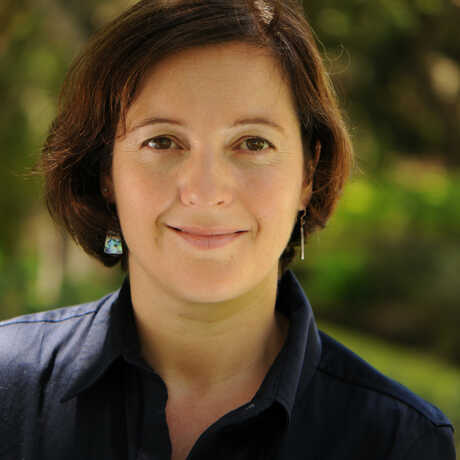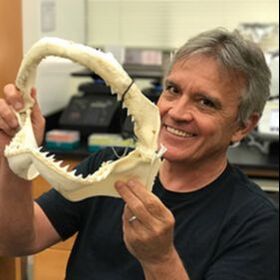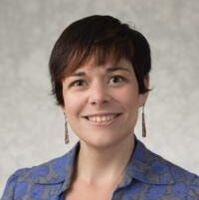Dr. Shannon Bennett
|
Thursday, November 11, 2021
Dr. Shannon Bennett - California Academy of Sciences "The Evolution of a Pandemic: Lessons from SARS-CoV-2 and Other Viruses" 7:30 PM - 2005 North Lawn Hall For more information about this talk, contact Kevin Kocot |
From: https://www.calacademy.org/staff-member/shannon-bennett-phd
As the Chief of Science and Harry W. and Diana V. Hind Dean of Science and Research Collections, Dr. Shannon Bennett is responsible for the Academy’s programs of scientific research and exploration, as well as overseeing the Academy’s priceless collection of nearly 46 million scientific specimens from around the world. In this role, she helps to shape bold new research initiatives and oversees a world-class team of explorers and scientific leaders who are working to explore, explain, and sustain life on Earth. Bennett also holds an appointment as one of the institution’s Patterson Scholars in Science and Sustainability.
Bennett joined the Academy in 2011 as the institution's first-ever Associate Curator of Microbiology, where she broadened the Academy’s research scope to include a dedicated focus on viruses and bacteria. Her specialty lies in infectious diseases that can be transmitted from animals to humans.
Prior to her work at the Academy, she was an Associate Professor at the Asia-Pacific Institute of Tropical Medicine & Infectious Diseases, part of the School of Medicine at the University of Hawaii. During her seven years at the Pacific Institute, she led a number of research projects on virus evolution, identification, and transmission with funding from the National Institutes of Health. She combines advanced technologies from genomics and bioinformatics to study dengue, hantavirus, influenza, and other viruses, and also bacteria such as leptospirosis and those found in mosquito vectors. Prior to her work in Hawaii, Bennett researched the dengue virus in Puerto Rico and parasitic roundworms in Texas and Vancouver.
She received her Bachelor of Science from McGill University and her doctorate degree in zoology from the University of British Columbia.
As the Chief of Science and Harry W. and Diana V. Hind Dean of Science and Research Collections, Dr. Shannon Bennett is responsible for the Academy’s programs of scientific research and exploration, as well as overseeing the Academy’s priceless collection of nearly 46 million scientific specimens from around the world. In this role, she helps to shape bold new research initiatives and oversees a world-class team of explorers and scientific leaders who are working to explore, explain, and sustain life on Earth. Bennett also holds an appointment as one of the institution’s Patterson Scholars in Science and Sustainability.
Bennett joined the Academy in 2011 as the institution's first-ever Associate Curator of Microbiology, where she broadened the Academy’s research scope to include a dedicated focus on viruses and bacteria. Her specialty lies in infectious diseases that can be transmitted from animals to humans.
Prior to her work at the Academy, she was an Associate Professor at the Asia-Pacific Institute of Tropical Medicine & Infectious Diseases, part of the School of Medicine at the University of Hawaii. During her seven years at the Pacific Institute, she led a number of research projects on virus evolution, identification, and transmission with funding from the National Institutes of Health. She combines advanced technologies from genomics and bioinformatics to study dengue, hantavirus, influenza, and other viruses, and also bacteria such as leptospirosis and those found in mosquito vectors. Prior to her work in Hawaii, Bennett researched the dengue virus in Puerto Rico and parasitic roundworms in Texas and Vancouver.
She received her Bachelor of Science from McGill University and her doctorate degree in zoology from the University of British Columbia.
Dr. Gavin Naylor
|
Thursday, November 18, 2021
Dr. Gavin Naylor - Florida Museum "Why are there so many different forms of life" 7:30 PM - 2005 North Lawn Hall For more information about this talk, contact Jason Pienaar |
As an evolutionary biologist, Dr. Gavin Naylor always been interested in the question “Why are there so many different kinds of living things”. This requires understanding patterns both in the fossil record and among living organisms. He chose to study sharks and rays because they have a long evolutionary history, a reasonably good fossil record, are well represented by living forms and have a number of unusual traits not seen in other vertebrate animals. In short, they are both intrinsically interesting and allow us to address evolutionary questions with broader implications. For example, Naylor’s favorite shark, the rare deep sea shark Euprotomicroides zantedeschia generates luminous fluid from a gland in its cloaca at depth to distract would be predators – in much the same way as an octopus deploys clouds of ink to avoid predation. Naylor’s overarching long term projects include (1) resolving the Chondrichthyan (cartilaginous fishes) Tree of Life, (2) comparative genomics of sharks and rays, (3) comparative skeletal anatomy of sharks and rays. Originally from England, Naylor obtained his PhD at the University of Maryland, went on as an assistant and associate professor of Zoology and Genetics at the University of Iowa, an Associate Professor in the School of Scientific Computing at Florida State University with a joint appointment in Biology and then an Endowed Chair of Bioinformatics and Full Professor at the College of Charleston before moving to the Florida Museum of Natural History.
Dr. Cara Ocobock
|
Thursday, February 3, 2022
Dr. Cara Ocobock - Notre Dame "The Cold Never Bothered Me Anyway: How Reindeer Herders of Sub-Arctic Finland Cope with the Cold" MOVED ONLINE: https://riverside.fm/studio/allele For more information about this talk, contact Chris Lynn |
Dr. Ocobock is the Director of the Human Energetics Laboratory at the University of Notre Dame. She is an assistant professor of anthropology; concurrent faculty with the department of gender studies; a fellow with the Eck Institute of Global Health; a fellow with the Institute for Educational Initiatives; and is affiliated with the Environmental Change Initiative, Health, Humanities, and Society Program, and the Sports, Media, and Culture minor. Her research program integrates human biology and anthropology, with a focus on the interaction between anatomy, physiology, evolution, and the environment. She explores the physiological and behavioral mechanisms necessary to cope with and adapt to extreme climate and physical activity. Ocobock works in northern Finland, in collaboration with researchers from the University of Lapland and University of Oulu. This project focuses on reindeer herders, a highly active cold climate population. Her research assesses their life ways, life history patterns, cold climate adaptations, and addresses potential health disparities. This work was funded by the National Science Foundation and the American-Scandinavian Foundation.
Ocobock’s research program also includes the anthropology of sports, particularly from a feminist perspective due to being a former powerlifter. Women are underrepresented in the field of sports and exercise physiology – both as researchers and as participants in research. This means that not only are we missing a critical research perspective, but that we are also woefully under informed in terms of women’s sports performance and training. Ocobock also strongly advocates for consistent, high quality science communication and does so through workshops and co-hosting the Human Biology Association podcast, The Sausage of Science, with Dr. Christopher Lynn from the University of Alabama.
Ocobock’s research program also includes the anthropology of sports, particularly from a feminist perspective due to being a former powerlifter. Women are underrepresented in the field of sports and exercise physiology – both as researchers and as participants in research. This means that not only are we missing a critical research perspective, but that we are also woefully under informed in terms of women’s sports performance and training. Ocobock also strongly advocates for consistent, high quality science communication and does so through workshops and co-hosting the Human Biology Association podcast, The Sausage of Science, with Dr. Christopher Lynn from the University of Alabama.



